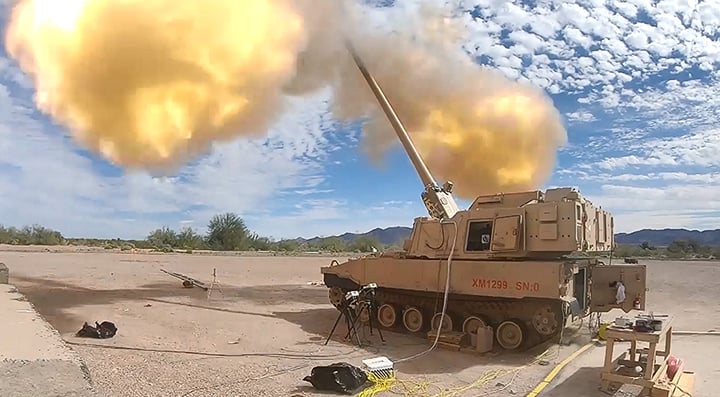
Extended Range Cannon Artillery (US Army stock photo)
WASHINGTON — A government watchdog says in a new report that problems remain with the Pentagon’s use of Middle-Tier Acquisition (MTA) to streamline development and fielding of new weapons and tech, which could undercut oversight and, ultimately, successful implementation.
The Government Accountability Office’s concerns come as the Defense Department’s use of Section 804 MTA (sometimes also called Mid-Tier Acquisition authorities) has ballooned, from 35 programs following the MTA “pathway” toward fielding in June 2019 to almost 100 in 2022, the report notes.
The report also comes in the midst of a swirling debate surrounding similar concerns from congressional appropriators, and new language in the fiscal 2023 omnibus spending bill that attempts to tighten top-level Pentagon control of MTA use — in the face of what a number of lawmakers in the House and Senate worry is abuse of the streamlined processes to escape oversight requirements.
FEATURE: Oversight or overkill? DoD faces new congressional order to detail Mid-Tier Acquisitions
The GAO report, “Middle-Tier Defense Acquisitions: Rapid Prototyping and Fielding Requires Changes to Oversight and Development Approaches,” details 15 MTA programs underway by the services and Special Operations Command. These include: The Army’s Extended Range Cannon Artillery (ERCA) program to upgrade to M109 self-propelled howitzer; the Air Force’s Angry Kitten Combat Pod (AKCP) program to develop a radio frequency electronic countermeasures system for aircraft self-protection; and the Space Force’s massive Future Operationally Resilient Ground Evolution (FORGE) system to process data from its missile warning/tracking satellite constellations.
GAO in particular hones in on concerns about a lack of transparency in many of those programs.
“For example, an unclear data framework and reporting guidance limit the visibility of MTA program structures, scope, and technical data. As a result, the oversight role of the Under Secretary of Defense for Acquisition and Sustainment with regard to the MTA pathway is diminished. GAO also found that DOD components provided the Under Secretary with inaccurate data,” the report says.
“Together, these issues complicate DOD’s efforts to conduct data-driven oversight of the MTA pathway,” GAO concludes.
Those findings echo GAO’s April 2021 report on DoD acquisition reform, which noted that “DOD plans to invest about $31 billion in current MTA programs, but cost reporting continues to be inconsistent. … We also identified other reliability concerns with MTA program data submitted to OSD [the Office of the Secretary of Defense] and Congress.”
The new report makes a whopping 26 recommendations as to how DoD leadership could improve management, oversight and accountability of MTA efforts — with the department concurring with 25 of them, and “partially concurring” with one. Those recommendations largely center around the application of “best practices” followed by industry for “successful product development,” the report explains.
“These include attaining sound business cases, applying iterative design approaches, off-ramping capabilities when needed to prioritize schedule, and incorporating feedback from users of initial capabilities. If the military departments and other DOD components incorporated these leading principles more fully into their MTA policies, they would be better positioned to meet their users’ needs with greater speed — the core goal of the MTA pathway,” GAO elaborates.
The one recommendation that face partial Pentagon pushback was GAO’s call for the Undersecretary of Defense for Acquisition and Sustainment “to improve its MTA data framework and reporting guidance (Recommendation 6),” the report says. “In its response, DOD stated that it is reviewing the existing framework and reporting procedures and, upon completion, will determine whether it needs to make changes to its data reporting policies.”
Following publication of this story today, a DoD spokesperson told Breaking Defense in an email that the department “understands concerns about the increasing number of MTA programs and appreciates Congressional interest in sufficient, responsible, and agile oversight of such programs.”
In a ‘world first,’ DARPA project demonstrates AI dogfighting in real jet
“The potential for machine learning in aviation, whether military or civil, is enormous,” said Air Force Col. James Valpiani. “And these fundamental questions of how do we do it, how do we do it safely, how do we train them, are the questions that we are trying to get after.”


























